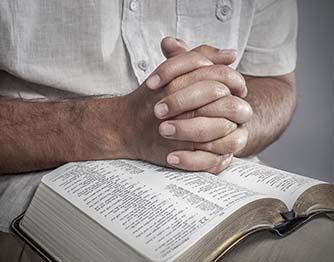“Neither are your ways My ways, saith the Lord.” —Isaiah 55:8 KJV
By John G. Bellett (Adapted)
Provoked And Proved
We are aware that in many different ways our fellow disciples try and tempt us, as, no doubt, we do them. We see, or we think we see, some bad quality in them and we find it hard to go on in further association with them. Yet the fault may be with us – mistaking a want of conformity of taste or judgment with ourselves for something to be condemned in them.
But the Lord could not mistake things in this way. He was never overcome by evil, but was ever overcoming evil with good – the good being in Himself. Pride, ill temper, indifference about others, carefulness about themselves and ignorance after painstaking instruction were some of the things in His disciples which He endured continually. His walk with them, in its way and measure, was a day of provocation much as the forty years of Israel in the wilderness had been. Again and again, Israel tempted and provoked the LORD, but in this they proved Him as well. He suffered, but took it patiently. He never gave them up. At the end of their walk together, He was nearer to them than ever.
Perfect and excellent this is, and comforting to us. The Lord’s dealing with our conscience never turns His heart from us. We lose nothing by His rebukes. He is quick to restore our souls that the conscience, so to express it, may be enabled soon to leave His school – our hearts finding their happy freedom in His presence again. We may think of this hymn:
| Still sweet ‘tis to discover, If clouds have dimmed my sight; When passed, Eternal Lover, Towards me, as e’er Thou art bright. |
Perfection
In the character and course of the ministry which He was called to take up, we see for each and every moment the same perfection and moral glory as in the path He trod daily. For example, consider that of Judge as in Matthew 23 and that of Advocate or Pleader in Matthew 22. I only suggest this, as the theme is too abundant.
His every step, word and action carried with it a ray of this glory. The eye of God had more to fill it in the life of Jesus than it would have had in an eternity of Adam’s innocence. It was in the midst of our moral ruin that Jesus walked, and from that region He was sent up to the throne on high. His was a richer sacrifice of sweet-smelling savor than Eden and the Adam of Eden would or could have rendered had they continued unsoiled forever.
The Same
Time made no change in the Lord. Kindred instances of grace and character in Him, before and after His resurrection, give us possession of this important truth. We know what He is this moment and what He will be forever from what He has already been, in character and in relationship to us. He is “the same yesterday, and to day, and for ever” (Heb. 13:8). The very mention of this is blessed.
Sometimes we may be grieved at changes and sometimes we may desire them. In different ways we all display the fickle, uncertain nature of human life. Circumstances, associations, friendships, affections and characters continually undergo changes which surprise and sadden us. We are hurried from stage to stage of life; affections and principles rarely staying the same with us.
But Jesus was the same after His resurrection as He had been before, though events had put Him and His disciples at a greater distance than companions had ever known or could ever know. They had exposed their unfaithful hearts, forsaking Him and fleeing in the hour of His weakness (2 Cor. 13:4) and need. He, for their sakes, went through death – a death as never could have been borne by another as it would have crushed the creature. After His resurrection the disciples were still poor, feeble Galileans, yet He was glorified with all power in heaven and on earth (see Matthew 28:18).
Grace Amid Doubt
Their forsaking Him did not change His love toward them. “Nor height, nor depth, nor any other creature,” as the apostle expressed, could do that (Rom. 8:38-39). Love defies them all; and He returned to them being the Jesus whom they had known before. He was their companion in labor (Mk. 16:20). On the sea in the day of Matthew 14 they thought that they saw a spirit and cried out for fear. But the Lord gave them to know that it was He Himself who was there – near to them and in grace, though in divine strength and sovereignty over nature (vv.22-33). And in Luke 24:40-43, after He had risen, He took the honeycomb and the fish, eating before them that with certainty and ease of heart they might know that it was He Himself.
In John 3:1-21 He led a slow-hearted rabbi into the light and way of truth, bearing with him in all patient grace. And thus did He again in Luke 24 with the two slow-hearted disciples who were finding their way to Emmaus (vv.13-35).
Mark 4:35-41 tells how He calmed the fears of His people before He rebuked their unbelief. He said to the wind and waves, “Peace, be still,” before asking the disciples, “How is it that ye have no faith?” Likewise, as the risen One, in John 21, He sat and dined with Peter in full and free fellowship, as without a breach in the spirit, before He challenged him and awakened His conscience by the words, “Simon, son of Jonas, lovest thou Me?” Peter had boasted earlier of special self-confidence: Though all should be offended, yet he would not, and though he should die with his Master, he would not deny Him (Mt. 26:35). But Peter’s Master had told him of the worthlessness of such claims; and He had told him of His prayer for him, that his faith should not fail (Lk. 22:31-32). When the boast was found to have been empty and Peter denied the Lord, even with an oath, his Lord looked at him. The prayer and the look availed. The prayer had kept his faith from failing and the look had broken his heart. Peter did not “go away,” but he wept bitterly (Mt. 26:75).
At the opening of John 21 we find Peter in the condition in which the prayer and the look had put him. He was enabled to give very sweet proof that his faith had not failed; for as soon as he learned that his Lord was on the shore he threw himself into the water to reach Him. This was not done as one who was repentant and sorrowing because of wrongdoing. Rather, it was as one who could trust himself to the Lord’s presence in full assurance of heart. In that character his most blessed and gracious Lord accepted him, and they dined together on the shore. The prayer and the look had already done their work with Peter and they were not to be repeated. The Lord simply went on with His work already begun to conduct it to its perfection. Accordingly, the prayer and the look were followed by the word.
Perfect Master!
He is the same to us yesterday, today and forever – the same in His gracious, perfect skill of love and going on with the work He has already begun. As the risen Lord, the service which He had left when He was taken away from His own He resumed from the point where it was suspended, knitting the past to the present. His was and is a service in the fullest grace and skill!
By John G. Bellett (Adapted)
| Not as Thy ways, our ways We bow before Thy face; Not like Thy thought, our thought, As by Thy Spirit taught. Not as our ways, Thy ways! Savior, Thy name we praise; Not as our thoughts, Thy thoughts, Told by Thy love-work wrought. |








